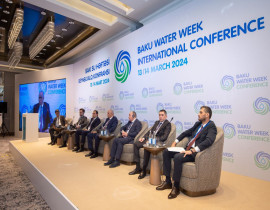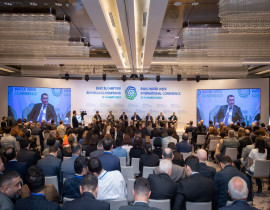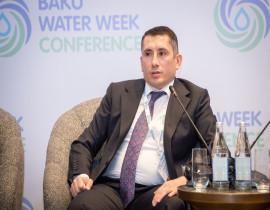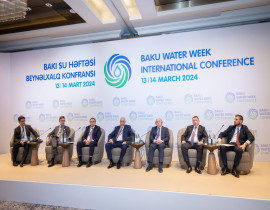The Director of "AzTəsərrüfat" LLC, Mr. Aydın Damirov, participated in the Baku Water Week International Conference.
In his speech, Mr. Damirov touched upon a number of important issues and emphasized the significance of holding such events.
We present his address in full:
Although the country’s natural and climatic conditions allow for the cultivation of agricultural crops throughout the year, only 55.2% of the land fund is suitable for agriculture. Since the majority of this land falls into arid zones lacking moisture, agricultural production here is impossible without irrigation. Azerbaijan’s water resources are very limited. Seventy percent of the surface water resources are formed outside the country’s borders, while only 30% are formed within its territory. During drought years, the reduction of surface water resources, the fact that the main flow of domestic rivers occurs in the spring, and the lack of regulation of most of these flows result in floodwaters flowing into the sea without being fully utilized, thereby complicating the provision of irrigation water for farmland. Increasing agricultural production directly depends on improving water supply. Continuous global climate change leads to a decrease in precipitation and water shortages, creating significant challenges for agriculture in the country.
The development of agriculture in Azerbaijan is largely based on irrigated farming. About 85–90% of crop production, and all cotton cultivation, are carried out on irrigated land. Proper monitoring of water use, correct selection of irrigation methods, and appropriate agro-technical practices can prevent the negative impact of irrigation water on soil. For this, it is necessary to determine soil moisture in the accounting layer using the gravimetric method in order to establish the timing and norms of vegetative irrigation as well as pre-planting irrigation.
Thus, the growth and progress of society will greatly depend on the development and efficient use of water resources. To obtain abundant and high-quality agricultural produce and to determine crops’ water demand, farmers must regularly monitor soil moisture, crop conditions, the state of reclamation and irrigation systems, and the ameliorative condition of cultivated land, coordinating comprehensive agro-technical measures accordingly. The nationwide policy, recommendations, and ideas of the National Leader in the field of reclamation and water management are being successfully continued by his worthy successor, President Ilham Aliyev. This is clearly demonstrated by the laying of the foundation of the Takhtakorpu Reservoir on November 8, 2007, the Shamkirchay Reservoir with a hydroelectric power plant on May 25, 2009, the commissioning of the Goytepe Reservoir in Jalilabad district on April 29, 2010, and the opening of the 10.7 km first phase of the Velvelechay-Takhtakorpu canal on August 15, 2011, as well as the inauguration of the Shamkirchay Reservoir with its hydroelectric station on November 15, 2014. The President has consistently monitored the construction of reclamation and water facilities across the country, while targeted measures in this field continue to this day.
The scarcity of freshwater resources, which has gradually deepened into a serious problem in the arid and semi-arid regions of the world, is a concern for all humanity. Currently, more than 40% of the world’s population faces problems with access to drinking water. Freshwater scarcity has already become a global issue, and its solution is only possible through the joint efforts of the world’s nations. Problems related to the efficient use of water resources are closely linked to economic reforms. The structure of crop farming in agriculture must be adapted to water availability. The expansion of water-intensive crop areas should not be encouraged. Instead, efforts should focus on developing and expanding the cultivation of new crop varieties requiring less water.
Under the leadership of Supreme Commander-in-Chief Ilham Aliyev, the successful military operations for the liberation of Azerbaijani territories that had been under Armenian occupation for nearly 30 years brought significant changes in the field of water resource management and utilization as well. As a result of these successful operations, the Sugovushan Reservoir on the Tartar River, the Cascade Reservoirs on the Kondalanchay River, and the Khudafarin Reservoir on the Araz River were liberated. The Presidential Decree of July 27, 2020, “On additional measures to ensure the efficient use of water resources,” along with numerous instructions by the President, has set forth important tasks for Azerbaijani science regarding the existing problems in the country’s water supply and their solutions. Improving water supply is not limited to saving water; research and practical work must also be carried out to increase freshwater resources. Only in this way can the main goal of Azerbaijan’s water policy be achieved — ensuring that the population and all sectors of the economy are supplied with the required amount and quality of water in accordance with international standards.
The President of the Republic of Azerbaijan has declared the liberated territories of the country as a “green energy” zone, with the aim of transforming them into a “net zero emission” zone by 2050. One of Azerbaijan’s five national priorities for socio-economic development until 2030 has been identified as becoming a “Country of Clean Environment and Green Growth.” In line with this priority, work is being carried out to improve the environment, restore and expand green spaces, and ensure the efficient use of water resources and sustainable energy sources.
Let us unite for a green, clean, and healthy world, for this will be the greatest treasure we pass on to future generations.





